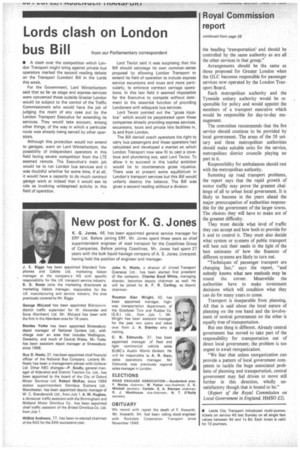Royal Commission report
Page 40

If you've noticed an error in this article please click here to report it so we can fix it.
the heading 'transportation' and should be controlled by the same authority as are all the other services in that group."
Arrangements should be the same as those proposed for Greater London when the GLC becomes responsible for passenger services now operated by the London Transport Board.
Each metropolitan authority and the Tyneside unitary authority would be responsible for policy and would appoint the members of a transport executive which would be responsible for day-to-day management.
The committee recommends that the fire service should continue to be provided by local government. The areas of the 58 unitary and three metropolitan authorities should make suitable units for the service, metropolitan district councils playing no part in it.
Responsibility for ambulances should rest with the metropolitan authority.
Summing up road transport problems, the report says that the rapid growth of motor traffic may prove the greatest challenge of all to urban local government. Et is likely to become in the years ahead the major preoccupation of authorities responsible for the government of the larger towns. The choices they will have to make are of the greatest difficulty.
They must decide what level of traffic they can accept and how both to provide for it and to control it. They must also decide what system or systems of public transport will best suit their needs in the light of the best estimates of how the finances of different systems are likely to turn out.
"Techniques of passenger transport are changing fast," says the report, "and nobody knows what new methods may be round the corner. Meanwhile the authorities have to make investment decisions which will condition what they can do for many years to come.
Transport is inseparable from planning. Al) that is said about the local nature of planning on the one hand and the involvement of central government on the other is equally true of transportation.
But one thing is different. Already central government has moved to take part of the responsibility for transportation out of direct local government; the problem is too urgent to await reorganization.
"We fear that unless reorganization can provide a pattern of local government competent to tackle the huge associated problems of planning and transportation, central government may feel driven to move still further in this direction, wholly unsatisfactory though that is bound to be."
(Report of the Royal Commission on Local Government in England, HMSO £2).
























































































































































